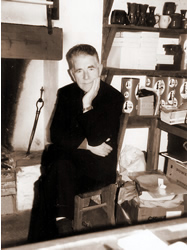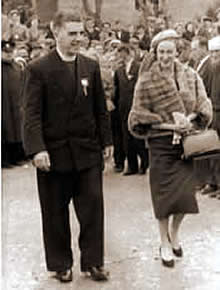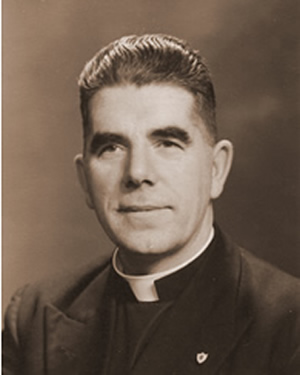Athar
Mhic Daidhir - Father McDyer
Father McDyer, the ‘can-do’ priest
who dreamed up the Folk Village Museum to help stem the tide of emigration.
"Action! Action against injustice, inertia, hypocrisy and greed!
It is for this that my whole being has yearned. In this I am moved
by the old
mythological leader, Fionn Mac Cumhall, who instructed his harpist
to play not the music of things that are said, but the music of things
that
are done." Fr. James Mc Dyer of Glencolmcille, An Autobiography
(1982)
 James Mc Dyer was born in a small townland called Kilraine in Glenties,
County Donegal in 1910. He was the youngest child of seven. The most
indelible impression of his childhood and adolescence was the 'convoy'
- a gathering of neighbours in the homes of those who were about
to emigrate, in order to wish last farewells. Convoys were a constant
feature of life
in West Donegal during the second half of the nineteenth and the
first
part of the twentieth century. McDyer’s recall of the pathos
and heartbreak of emigration remained with him all his life and inspired
him to do all he could to give his parishioners reasons to stay. James Mc Dyer was born in a small townland called Kilraine in Glenties,
County Donegal in 1910. He was the youngest child of seven. The most
indelible impression of his childhood and adolescence was the 'convoy'
- a gathering of neighbours in the homes of those who were about
to emigrate, in order to wish last farewells. Convoys were a constant
feature of life
in West Donegal during the second half of the nineteenth and the
first
part of the twentieth century. McDyer’s recall of the pathos
and heartbreak of emigration remained with him all his life and inspired
him to do all he could to give his parishioners reasons to stay.
Father McDyer was educated at St Eunans College, Letterkenny,
and entered Maynooth seminary in 1930. In 1937 he was ordained and
went to Wandsworth
in London, where he worked as a curate with Irish emigrants. The
war years were spent in London and the South East of England. His
descriptions
of the conditions in London during the Blitz are harrowing in the
extreme. He returned to Donegal in 1947 and was stationed on Tory
Island, where
he spent four and a half years before being transferred to Glencolmcille
in December 1951.
 At
this time Glencolmcille suffered from a lack of employment and, consequently,
from emigration. During the seventy years before
Fr McDyer’s
arrival, the Parish lost some 60% of its population due to root
problems of poor
land, distance from any centre of population, and lack of industry.
These were not new problems, having been present since the time
of the Great
Famine a hundred years previously. At
this time Glencolmcille suffered from a lack of employment and, consequently,
from emigration. During the seventy years before
Fr McDyer’s
arrival, the Parish lost some 60% of its population due to root
problems of poor
land, distance from any centre of population, and lack of industry.
These were not new problems, having been present since the time
of the Great
Famine a hundred years previously.
Father McDyer determined to do all he could to help break this
cycle. He combined a shrewd intelligence with boundless enthusiasm
and had
an endless supply of ideas for new projects designed to boost
services and
employment. In 1953, due his efforts, a community centre was
built in Glencolmcille. Very little money was available and
the centre
was built
by voluntary labour. The first sod was turned in January and
the work was completed 12 weeks later. He then turned his attention
to the installation
of electricity – forcefully putting his case and pulling what
strings he could to have electrification completed quickly.
 The Folk Village Museum was built in three months in 1967.
Formal planning permission to build it was only received
the day after
it was officially
opened by Mr Childers, Minister for Transport and Tourism. The Folk Village Museum was built in three months in 1967.
Formal planning permission to build it was only received
the day after
it was officially
opened by Mr Childers, Minister for Transport and Tourism.
In
1986 Canon McDyer as he was then retired. His retirement was marked by presentations,
speeches on a night of great joy, and sorrow, in the Glen Bay Hotel. In June
1987 he celebrated the Golden Jubilee of his ordination to the priesthood.
This event was marked by a special mass in Carrick with Dr Hegarty, Bishop
of Rahoe. On the 25 November 1987 Canon McDyer died quietly in his sleep.
His enthusiastic, sometimes, unorthodox contribution to the Parish of Glencolmcille
over thirty-five years can still be seen with projects like the Glencolmcille
Folk Village Museum, the Errigal Fishing Factory and he continues to hold
a special place in the memories of the people of Glencolmcille. Father
McDyer had boundless enthusiasm and energy, a shrewd intelligence and an
endless supply of ideas for solving the problems in the area. He undertook
many projects within the Parish of Glencolmcille, amongst which was the
Folk Village Museum.

Father McDyer's autobiography and histories
of the Parish of Glencolmcille
are available in the Craft
Shop, Folk Village, Glencolmcille, County Donegal.

Top
|

